“You think it’s all made up don’t you. You think everything is just yarns and newspaper stories.”
I recollect being eight when I first watched Andrew Dominik’s Western epic “The Assassination of Jesse James by the Coward Robert Ford” (2007). It was during a hot Summer afternoon and my father and I took shelter at the neighborhood sports bar to cool off. While the men loudly discussed soccer and horse flies roamed around an ashtray—I sipped my Lemon Lipton iced tea and kept my eyes peeled at the mounted TV in the corner. Through this small box, I was teleported into a stunning Western landscape, where wheat danced to the wind and fires were set ablaze in the horizon. I naively expected the usual Western tale that I had grown fond of as a child, but instead was about to watch a unique type of Western story unfold: where our titular characters aren’t glamorized, but rather stripped of their enduring mythical status.
The film centers around American outlaw Jesse James (Brad Pitt), and depicts the events that culminate in his assassination by fellow outlaw and admirer, Robert “Bob” Ford (Casey Affleck). Whether the audience is familiar with the real centuries-old tale, the revealing title gives us a good glimpse into Dominik’s use of storytelling. Because despite disclosing the ending to the audience, it is by assigning roles to our titular characters—Jesse as a fallen victim and Bob as merely a ‘coward’—that allows Dominik to set up plot expectations which he will break in order to unveil the real facades of the two men. In fact, we see the very first pattern in the beginning, where we are presented to contradictory visuals and hearsay about Jesse.
Cued in with the melancholic score by Nick Cave and Warren Ellis, the film starts with time-lapses of passing clouds. We’re first shown Jesse on a rocking chair, reclining back and forth while displaying a disconcerting look as if he were in deep thought, before turning his head to the window. This is a rather memorable shot, as Dominik later reuses it to portray Jesse’s paranoia and deteriorating mental state. We’re then taken through glimpses of his normal daily life: such as tending to his wife, Zee (Mary-Louise Parker), and his two children, conducting business in Kansas City under the guise of ‘Thomas Howard,’ and roaming through the prairies on his own. All the while, the narrator (Hugh Ross) gives us details about Jesse which don’t fully align with what we’ve been seeing.
Near the end of the sequence as Jesse maintains an unblinking gaze while staring beyond the fields at dusk, the narrator adds: “He also had a condition that was referred to as granulated eyelids and it caused him to blink more than usual, as if he found creation slightly more than he could accept.” One of the ‘mismatched’ descriptions that yet heightens and glorifies his existence.
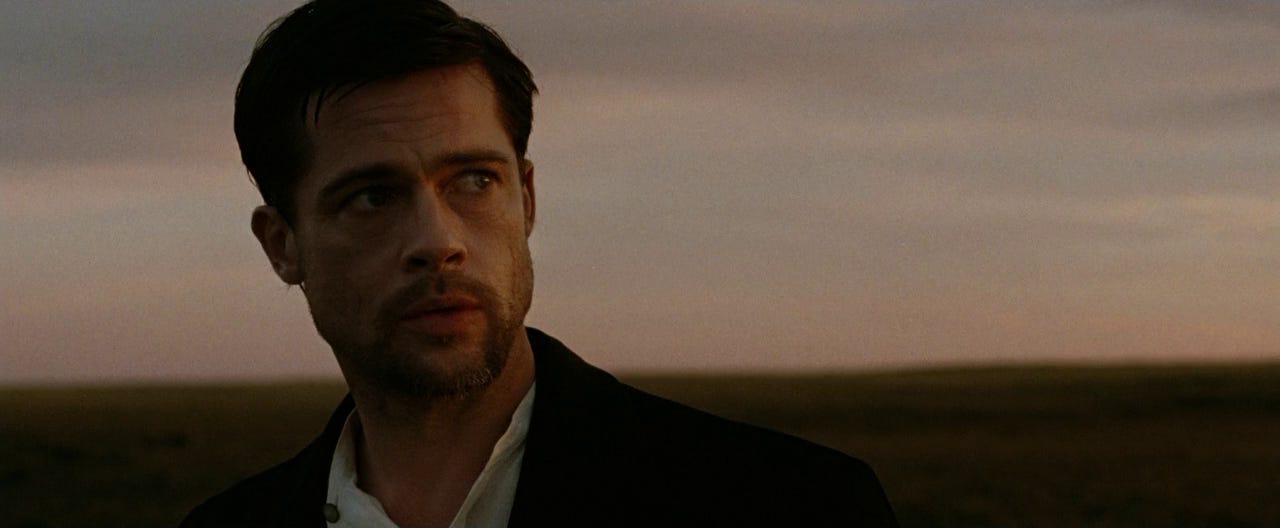
What also becomes noticeable during this opening is none other than cinematographer Roger Deakins’ stunning work in this film. He opts for a muted palette which contributes to the film’s somber tone; and for the intermittent, narrated sequences, Deakins uses a lens (now dubbed the Deakinizer lens) that creates a vignette effect around the shot to emulate old photographs, as well as adding color diffraction on the edges that slightly disfigures what we’re seeing. Though it’s worth mentioning another form of blurring effect that becomes pivotal to understanding Bob’s inner self, such as having him stare through windows with contorted glass that warps what’s outside.
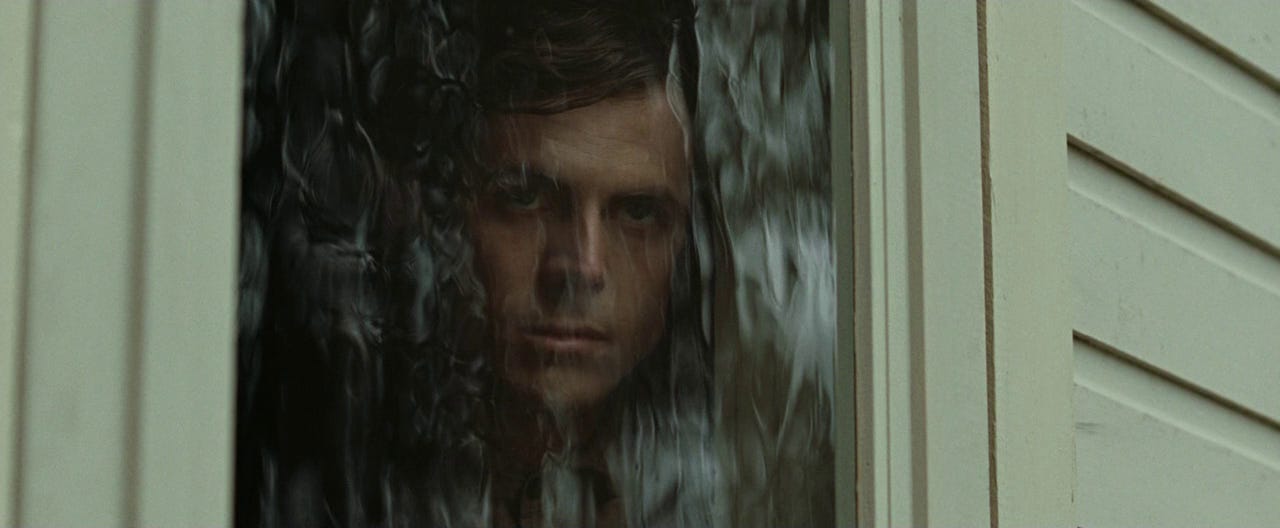
Contrary to Jesse’s striking introduction, Bob is revealed amid his walk to meet Jesse and the James Gang. The camera follows him closely from behind, also capturing the questionable looks that Bob elicits from the gang. His face is shown to us only after noticing Jesse from a distance and pauses to look at him in adoration. A particular expression—and feeling—that Bob carries throughout the film, though a dissipating one, as he becomes further disillusioned with Jesse. Hesitant to first approach him for permission to join the gang, Bob instead asks Jesse’s older brother, Frank (Sam Shepard), and adds: “I honestly believe I’m destined for great things, Mr. James.” Frank rebuffs him and tells him that he isn’t special, before holding him at gunpoint to leave him alone. Throughout this interaction, Dominik realistically portrays Bob as boyish and highly ambitious—the latter quality revealing how quickly he can disguise his lack of self-esteem, which ultimately establishes the crux of Bob’s desire to get closer to Jesse.
Because Bob’s intentions are also essential to the plot, Dominik doesn’t shy away from depicting it. He does this best during the scene when Jesse has dinner with Bob, Charlie (Sam Rockwell), and their relatives. As Bob’s admiration of Jesse is brought to break the silence, Bob proudly recounts a list he used to keep of their similarities. Expecting validation from Jesse, he is instead humiliated and met by laughter. Jesse compares Bob’s story to that of George Shepherd, another outlaw who expressed affection for him only to develop a grudge that turned into an assassination attempt—a story that not only foreshadows the ending, but also begins Bob’s resentment of Jesse.
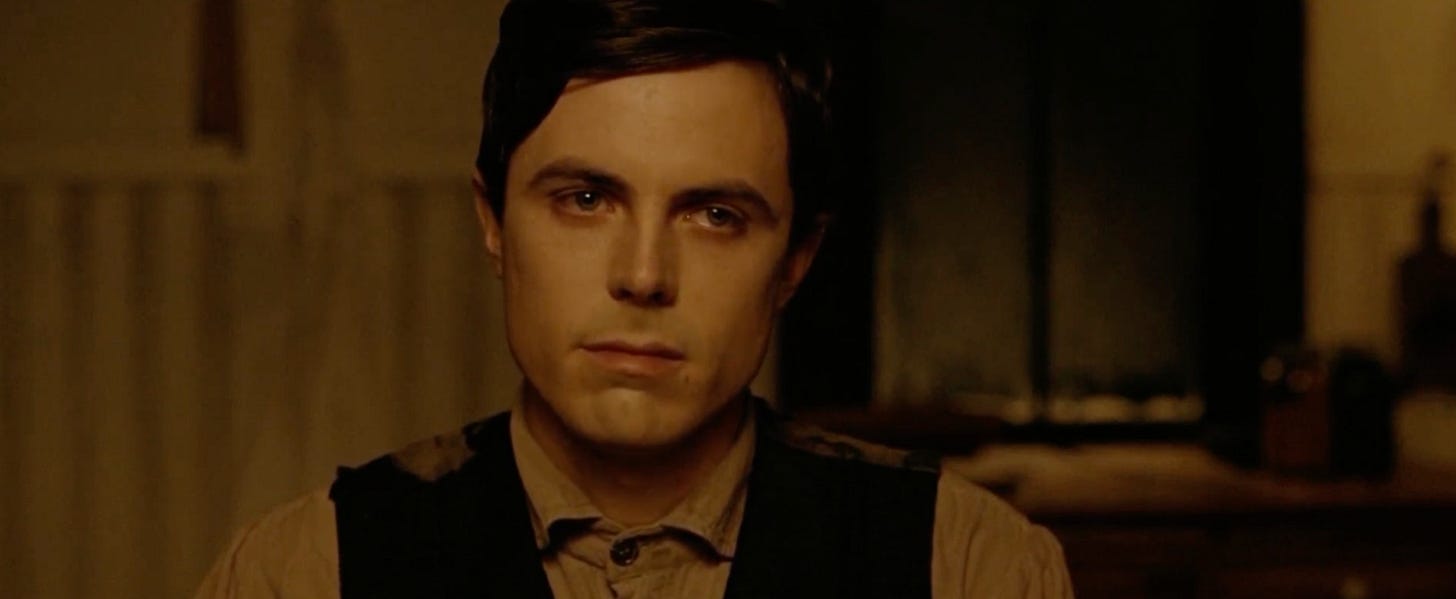
While “The Assassination of Jesse James by the Coward Robert Ford” tackles the cliched notion of ‘never meet your heroes’ through Bob, we also recognize the problem with Jesse’s ‘Robin Hood’-like portrayal by newspapers and books. From their earliest conversation, Jesse makes it clear to Bob that all the stories about him aren’t real. In a similar vein, the film sets out to tease the audience with what’s real versus fiction through the narrated sequences, though leaving enough visual cues to let us understand the deceptive nature of media. By the end, Jesse and Bob have both carved a tragic path they can’t go back from—regretful and detached by the crimes they’ve committed.


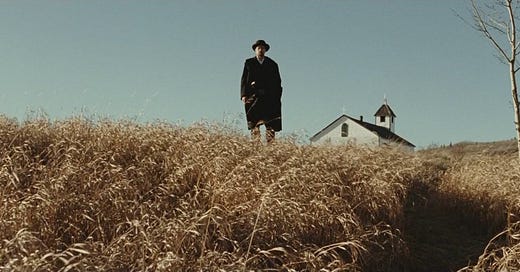




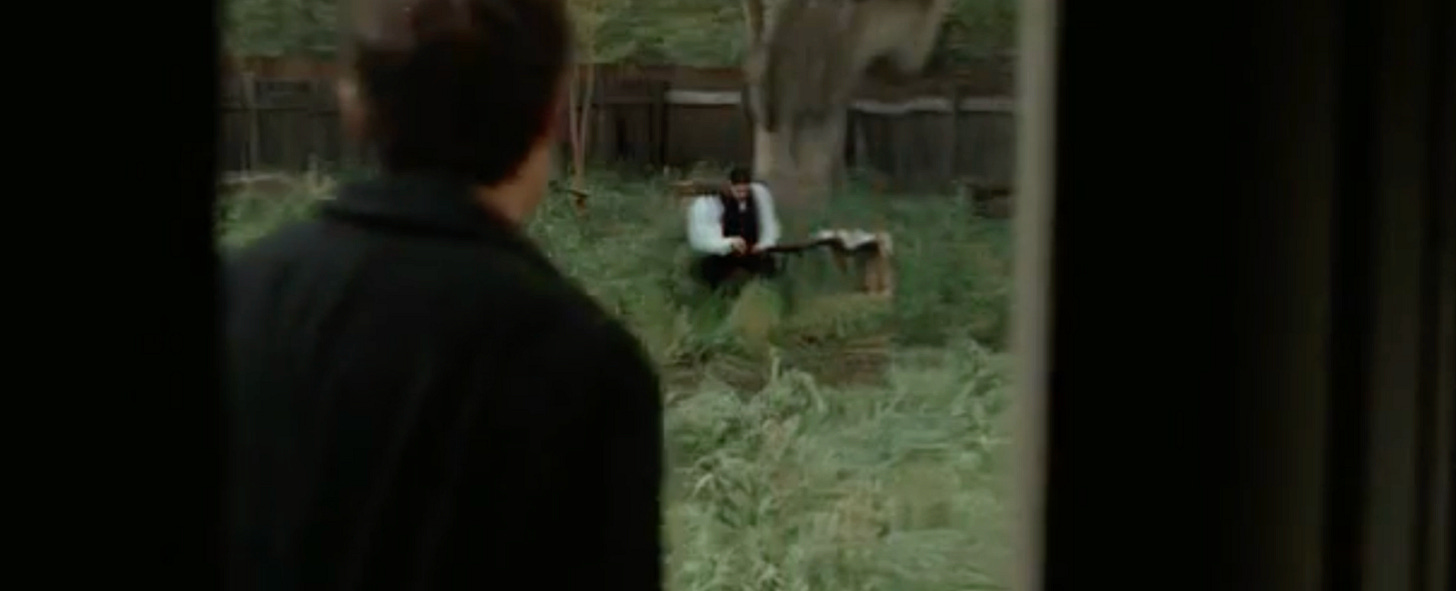

I've been meaning to watch this forever but now I have to. Stunning reveiw and analysis! Thanks for contributing
Incredibly thoughtful and well-done analysis with such beautiful imagery! It really makes me want to watch this movie :)